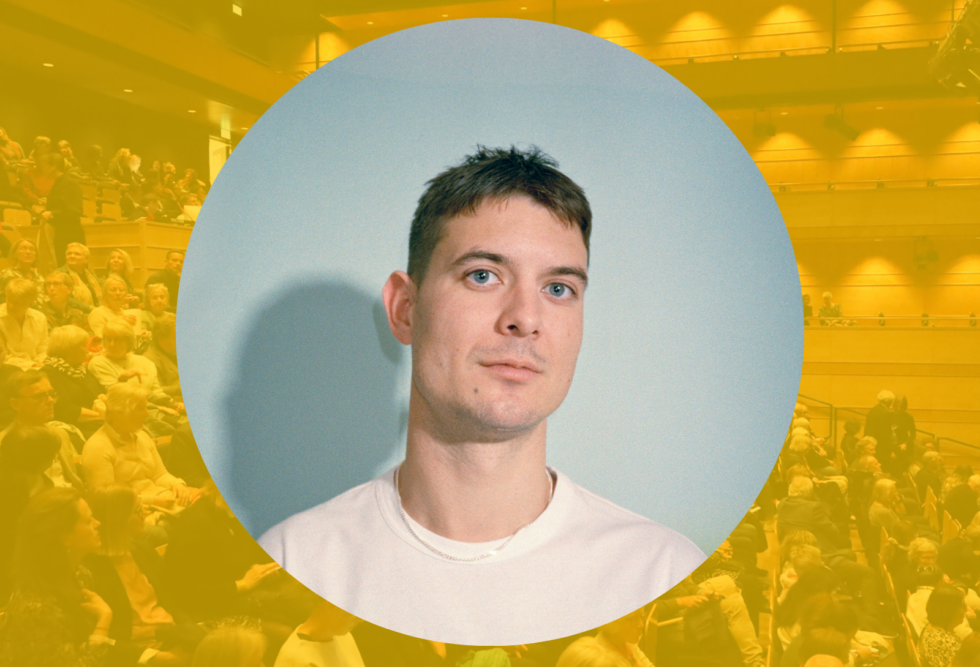The Bjørnson Prize for 2024 is awarded to Danish author Caspar Eric for his poetic oeuvre and strong commitment to bringing important themes into the broader, collective conversation.
From the jury’s rationale:
His latest work, New Balances, from 2023, has been labeled as “handicap poetry”, offering a direct, furious, and thought-provoking insight into how people with disabilities are encountered in public spaces and often silenced in public discourse.
The poems seek “new physical and poetic ways to exist in the world, and perhaps also a language that can touch us—with humor, power, and a sharp look at the intersection between the private and the political.” (Gyldendal.dk)
In addition to his work as a poet, Eric has also been deeply involved in shedding light on this overlooked field through other channels. In the critically acclaimed podcast series “What We Carry” (DR, 2021), he takes individuals who, for various reasons, have special relationships to their bodies, on walks in the Danish landscape. In this way, he illuminates the specific challenges faced by those with cerebral palsy while opening up enlightening and wise reflections on what we all have: our bodies.
Caspar Eric, born in 1987, made his debut in 2014 with the book 7/11, “about being young in 2014,” which earned him a place among the shining young stars of Danish poetry according to critics and readers. The following year, he released the epic poem “Nike”, which addresses the relationship between the individual’s body and society, historically and in contemporary times, and describes a protagonist with cerebral palsy, similar to the author himself.
His other works include the poetry collection AVATAR (2017), which is based on texts, statements, or artworks by and about young men who have committed suicide, addressing melancholy, capitalism, and the demand for the good life. Next came the collections Everything You Own (2018) and I Don’t Want to Go Back – Poems from the Days of COVID-19 (2020), consisting of poems written every day for 80 days. His sixth poetry collection, We Can Do A Lot (2021), tackles themes about a world in a state of emergency.
Through his poems and his clear presence in public life, Caspar Eric has thrust the vulnerable human body into the ring against society’s often inhumane demands to perform and fit in. His voice is perceived as an original and powerful defense of humanism and genuine equality.
“I am deeply grateful for to be honoured with an award such as the Bjørnson Prize,” Eric says. “For me, art and poetry have always been important precisely because they allow us to think and speak in new ways – especially about the bodies that are far too often relegated to the shadows of the welfare state. Both globally and locally, we are currently in a place in the Nordic region where the care we provide to vulnerable, disabled, and racialised bodies is seriously under pressure. Seen in that light, a prize like this naturally makes me want to continue fighting. But I also hope it can be an opportunity to say to those with different bodies: You deserve to be seen as something beautiful, and most importantly: We have not forgotten you.”
Facts about the Bjørnson Prize:
– The Bjørnson Prize is awarded to a Nordic author for a literary work and societal engagement in the spirit of Bjørnson.
– Recent winners: 2018: Johannes Anyuru (SE), 2019: Carsten Jensen (DK), 2020: Maja Lunde (NO), 2021: Sara Omar (DK), 2022: Niviaq Korneliussen (GR), 2023: Åsne Seierstad (NO).
– The prize was established and awarded by the Bjørnson Academy from 2004 to 2020. Since 2018, it has been in collaboration with stakeholders in Lillehammer, who developed the Bjørnson Seminar in connection with the prize. When the Bjørnson Academy ceased its operations in 2021, responsibility for the prize was taken over by Nansenskolen, Inland Norway University of Applied Sciences, the Norwegian Authors’ Union, Lillehammer UNESCO City of Literature, Innlandet County Municipality, Lillehammer Museum, and the Norwegian Festival of Literature.
– The 2024 jury consists of Joakim Hammerlin from Nansenskolen, Hans-Jørgen Wallin Weihe from Inland Norway University of Applied Sciences, Birger Emanuelsen from the Norwegian Authors’ Union, Cathrine Strøm from Lillehammer UNESCO City of Literature, Linn T. Sunne from Innlandet County Municipality, Kristin Brandtsegg Johansen from Lillehammer Museum, and Yukiko Duke from the Norwegian Festival of Literatuer.
– The prize amount is 100,000 NOK. Gunnar Bjerke’s Cultural Fund has contributed 100,000 NOK in prize money. The seminar is funded by the Fritt Ord Foundation as well as the parties involved in the collaboration.

